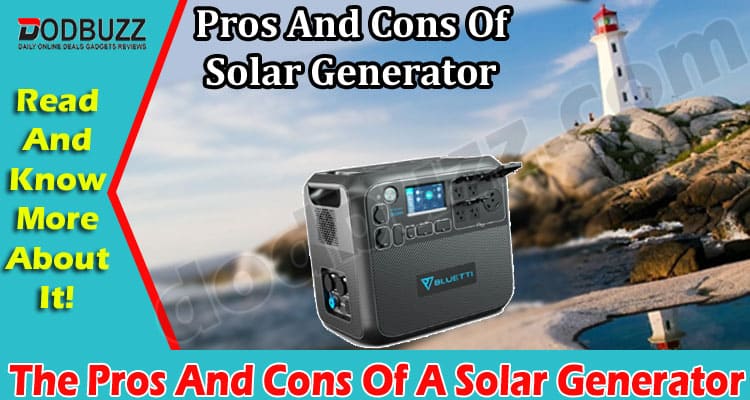Solar Generator: When the grid goes down, or you’re on a camping trip, and you need to power your devices, the Solar generator is your best investment for situations like this. It serves as an improved gas-powered solar generators.
This article will explain solar-powered generators, how it works, weigh the pros and cons, and the best way to use this technology.
About Solar Generator
Almost everyone is already familiar with the theory that a solar panel runs off through solar panels instead of fossil fuels. A portable solar generator uses the sun’s energy and reserves power in the battery for later usage. These panels are mostly for RV camping. The solar generator works quite differently, with features such as a rechargeable battery, charger, inverter, and solar panels.
The rechargeable battery gets its energy via the solar charger from the solar panels, which converts Direct Current (DC) to Alternating Current (AC) electricity from the inverter.
How Do Solar Panels Function?
It consist of four components:
- Solar panels
- Solar charge controller
- Rechargeable solar batteries
- The inverter
Solar Panels: Direct present energy is produced using solar cells.
Solar Charge Controller: The solar charging regulator controls the strength of the straight current electricity before it enters the cell.
Rechargeable Solar Batteries: The regulated electricity from the solar panels needs a store for later use. This is where the rechargeable batteries come in. Most of the solar generators sold today use lithium-ion batteries.
The Inverter: The inverter converts electricity into energy, or AC power, which most appliances and devices use.
The Pros
Free Fuel From Sun
One of the best benefits of a solar power generator is its ability to function without fuel or diesel. Solar panels ensure you use free, unlimited energy sources and worry less about availability or price fluctuations. Also, solar energy is more available in most remote areas than gasoline or fuels.
Minimal Noise
Solar generators do not have moving parts, significantly reducing the required maintenance. There’s no need to fix unstable tires, wires, and plugs. You can sleep peacefully without noise disturbance and have a lesser noisy and polluted environment.
No Fumes
Due to the use of diesel or gasoline, the fuel-powered generator releases carbon monoxide – a cause of severe health hazards. The pollution caused by these machines is why people prefer to use them outdoors or at a safe distance from buildings. Since solar power generators don’t have any trouble relating to fumes or pollution, it’s safe to say it’s the safest option, even for indoor use.
The Cons
Slow Charging
Even though there is no need to worry about gas, the primary power source of the portable power station is from the sun. However, charging the battery with solar panels can take a longer time. Averagely, The 100 watt solar plate would require more than 6 to 8 hours to charge up a solar cell. The Acevolt Campower 2000 portable power station is compatible with home outlets or car charging and can go from 0 to 100% in less than 2 hours.
Low Quantity of Electricity
The solar emitter storage capacity determines how much it can power. Most solar generators may be good enough to charge phones, laptops, and probably during trips outside the grid. However, it may fall short in powering your entire home. While the size of the solar generator can be an advantage in determining the power it can supply, the solar generators can run appliances for longer periods.
High Upfront Costs
Investing in Solar generators may have high upfront costs, but it assures you lower operational costs. This means that it may be quite expensive to buy, but you will have more to save than using a gas generator that requires you to purchase gasoline or diesel and spend a lot on maintenance. With the solar generator having lower operating, you get to spend less over its lifetime use.
The Best Ways To Use The Solar Generator
Solar power generators can run small appliances like charging your devices. They serve as a means to provide electricity for RV camping trips due to their portability.
Solar generators for a home can also power some essential appliances, especially in a state of emergency. It’s most likely that a portable generator won’t have The solar emitter storage capacity.
With this done, you are sure of backup power in case of electricity shortage, which helps to cut down on bills all year. Ensure you understand how to get the correct estimate of how much energy your home needs, how solar panel fits into this role, and how many solar panels you need to power your home.
FAQ
What is a solar generator?
A solar generator is an essential backup device that works alongside solar panels to power homes. It’s crucial during power outages or off-the-grid living and camping.
Why is solar energy good for the environment?
As a renewable power source, solar energy reduces gas emissions and pollution and improves the climatic condition to ensure protection for ecosystems, including humans and wildlife.
How does solar energy affect the environment?
By recharging with energy from the sun, solar energy enhances air quality and reduces the inputs for energy production. Thus, this saves the environment from air pollution.
Conclusion
Solar-powered generators are reliable and pocket friendly with a bonus of no air and noise pollution. One important thing to look out for is the battery capacity, usually measured in watt-hours. These solar generators provide electricity for any task. Take note of the off-grid solar system and the off-grid solar system packages with the batteries.







